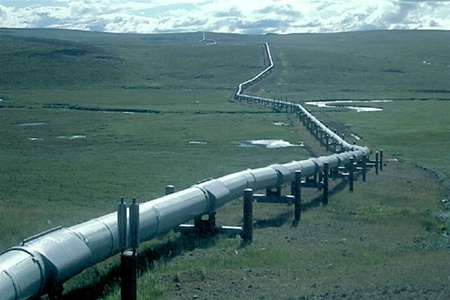Bulgaria regrets Nabucco project "is stuck"

By Aynur Jafarova
Bulgaria regrets that Nabucco pipeline project, planned to carry natural gas from the Caspian Sea to Europe, is stuck, Dow Jones quoted the country's Prime Minister Boyko Borisov as saying.
"We are paying our duties, but unfortunately countries and companies are leaving this project one by one," Borisov said in a press conference after meeting the European energy commissioner in Brussels last Friday.
Borisov added that his country is exploring gas reserves in the Black Sea and may have its own production in the years to come.
Bulgaria is key in the European Union's effort to diversify its gas supplies away from Russia. It would be a crucial transit country for Nabucco, which would carry Azerbaijani gas from Turkey to Austria. But it is also being courted by Russia, whose gas giant Gazprom is building South Stream, a massive gas pipeline that would carry Russian gas to Europe bypassing Ukraine, and could go through Bulgaria.
Germany's RWE, which is one of Nabucco West shareholders, is about to quit the project and could sell its 16.1 percent stake to fellow shareholder Austrian OMV. In May, an RWE official told Azerbaijan's Trend news agency that the utility was studying the conditions of Nabucco gas pipeline project's new version (Nabucco West) and its ability to meet Europe's strategic goals, adding that the plans for new pipeline projects change general conditions for the Nabucco project.
A deal to transfer the German utility's stake could take place before the end of the year.
Last week OMV's CEO Gerhard Roiss confirmed that his company was in talks with RWE over acquiring a stake in the Nabucco project.
However, according to Roiss, RWE's exit wouldn't affect viability of the pipeline project, Bloomberg reported. "It is not an issue of control, it's an issue of investment. The shareholders of Nabucco at the end will be the ones who have the gas," Roiss said.
Roiss said OMV will consider building its own pipeline depending upon results of Black Sea natural gas discoveries.
Managing Director of Nabucco Gas Pipeline International, Reinhard Mitschek, said at the 2012 Frankfurt Gas Forum that the Nabucco project is robust despite changes in the shareholder structure.
"In my view, there is no reason to doubt Nabucco´s success. As in every project, there are remaining risks. But we established risk management, identified potential threats, and we are working on them. For me, there is no doubt that the Shah Deniz consortium [developing Azerbaijan's giant offshore Shah Deniz field] will decide on Nabucco in June next year," he said.
"The volume of gas production in Azerbaijan will increase to 20 bcm by 2015 and up to 40-50 bcm by 2025. So, we are confident to receive enough gas to meet Europe´s demand. Most of all, we are convinced that Nabucco will be profitable," Mitschek underlined.
What is the main reason for RWE's withdrawal from the Nabucco project?
Editor-in-Chief of Eurasia Energy Observer Andrej Tibold considers that the main reasons are most likely reevaluation of the project and a strategy revision.
"The whole concept of the initial Nabucco pipeline has been changed and downgraded in size and length to the so-called Nabucco West option," Tibold said.
"Its effect will remain limited mostly to the South Eastern European market and [will] not significantly affect the northern and central Europe, where RWE's main market is," Tibold said.
Energy analyst at the Centre for Global Energy Studies (CGES) Julian Lee belives that possible withdrawal of Germany's RWE from the Nabucco West project would not significantly influence the final decision of the Shah Deniz consortium on a pipeline route to transport Azerbaijani gas to Europe.
"I am not particularly concerned about RWE's possible departure from the Nabucco West project and I think it will have little impact on the selection of a route by the Shah Deniz consortium," Lee wrote Trend via e-mail.
Lee stressed that Shah Deniz consortium members have already said that they want to take a stake in whichever pipeline is selected -- Trans Adriatic Pipeline (TAP) or Nabucco West -- to carry gas from Turkey's western border.
"This would mean that existing shareholders would either need to reduce their stakes in the project or leave it altogether. Nabucco West will not reach as far as Germany in any case and the smaller project is unlikely to carry gas from the project that RWE is pursuing in Azerbaijan," Lee said.
Gas which will be produced during the second stage of Azerbaijani Shah Deniz gas field development is considered as the main source for the Nabucco project.
The Shah Deniz consortium plans to make its selection between Nabucco West and TAP in 2013.
According to a representative of Azerbaijani state oil company SOCAR, the main criteria upon which a route will be selected include possible European regional markets, possible gas prices, marketing, and the possibility of the expansion of capacity amongst other factors.
"Commercial attractiveness is important to us," he added.
Nabucco West, a short-cut version of the Nabucco project, envisages the construction of a 1,300 km pipeline (Bulgaria: 412 km, Romania 469 km, Hungary 384 km, Austria 47 km) from the Turkish-Bulgarian border to the Austrian Baumgarten. The shareholders of Nabucco are Austrian OMV, Hungarian FGSZ, Bulgarian Bulgargaz, Romanian Transgaz, Turkish Botas and German RWE.
The TAP project is designed to transport gas from the Caspian region via Greece and Albania and across the Adriatic Sea to southern Italy and further to western Europe.
TAP's shareholders are AXPO of Switzerland (42.5 percent), Norway's Statoil (42.5 percent) and E.ON Ruhrgas of Germany (15 percent).
